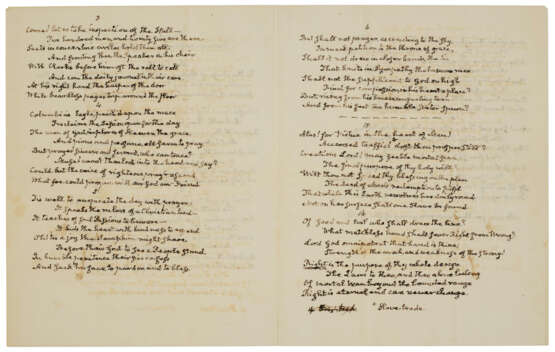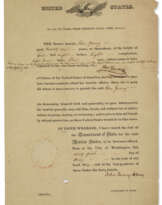ID 887958
Lot 180 | An anti-slavery poem
Estimate value
$ 50 000 – 80 000
ADAMS, John Quincy (1767-1848). Autograph manuscript, " "Fragments From an unfinished manuscript: An Epistle. To the Muse of History, perched on her Clock-wheeled Car over the door, fronting the Speaker's Chair, in the Hall of the House of Representatives of the United States," n.p., [ca. 1840].
Four pages, 254 x 202mm (partial separations along horizontal folds)
"And say not thou 'My Country, Right or Wrong'" Adams views Congressional tolerance of slavery and foresees the day when "while this earth revolves her daily round, not on her surface shall one slave be found."
A powerful satirical poem condemning his fellow congressmen and eloquently laments in verse that his nation continues to tolerate human slavery. Adams evokes his historic battles in Congress, calling upon Clio, the Muse of History (part of the carved woodwork above the door of the House chamber) to witness the epic contest: "Muse! quit thy Car! come down upon the floor: And with thee bring that volume in thy hand: Rap with thy marble knuckles at the door And take at a Reporter's desk thy stand Send round thy Album, and collect a tome Of autographic rulers of the land Invite each Solon to subscribe his name A self-recorded candidate for fame" [Stanza 2:] "Come! Speak thy thoughts Historic Muse! and tell the truth of all that passes in thy sight Say! on whose lips Persuasion dares to dwell Point out the champions rampant for the fight Seest thou a Saga, wild tumults rage to quell, And ears all listening with intense delight. Behold them gathering at their country's call Show me the stars ascendant, great and small." Because the House's daily sessions begin with a prayer, Adams expresses the hope that God might forgive them for the national sin: "But shall not prayer, ascending to the sky, In meek petition to the throne of grace, Shall it not draw in dozen hands the tie That knits in Sympathy the human race. Shall not the supplicant to God on high Find, for compassion in his heart a place?" In Stanza 15, Adams laments the continued tolerance of the slave trade by a nation conceived in liberty: "Alas! for Virtue in the heart of Man! Accursed traffick dost there prosper still? Creations Lord! may feeble mortal scan The final purpose of thy holy will? Wilt thou not speed thy blessing on the plan The deed of Man's redemption to fulfill That while this Earth revolves her daily round, Not on her surface shall one slave be found." (Adams footnotes the phrase "accurs'd traffick," identifying it as "slave-trade" beneath.) The Representatives' actions, Adams writes, will seal the national fate in the eyes of God, since "Right is eternal and can never change." In the penultimate stanza, Adams pleads with his fellow congressmen to avoid bitter sectional divisions: "And when, throughout the checker'd scene of Life, Thou and thy neighbour cross each others path; When adverse interests fester into strife, And rival passions kindle into wrath; Restrain thy hand, nor grasp the deadly knife. Rely on God, to rescue thee from death Before him kneel the fountains of all might And bend thy Soul to his behest of Right." He concludes: "And say not thou 'My Country, Right or Wrong' Nor shed thy blood for an unhallow'd cause. Thy life, and all thou hast to her belong And free submission to her righteous Laws But justice holds no balance for the Strong; Her sword to sanction wrong she never draws. If then thy Country tramples on the Right-- Tear up her Banner and avert thy sight—"
Throughout his long career, Adams evidenced a strong literary bent. While in Germany he translated Wieland's Oberon from the German, and left a modest, but interesting body of original verse including an 1848 collection entitled Poems of Religion and Society. The verses here apparently comprise a fair copy (stanzas 1-6 and 15-18) of an even more extensive work; the shakiness of Adams's hand suggests that it may date from his last years. After leaving the White House in 1825, Adams had won election to the House (the only former President to have done so). Reflecting the increasing militancy of the abolitionist movement, anti-slavery petitions had begun to flood Congress; many originated in New England and were sent directly to Adams, who became the movement's veritable lightning rod. The powerful slave-holding bloc in Congress rallied vigorously in defense of what they saw as an essential right guaranteed by the Constitution. Adams argued vociferously for what he believed was the First Amendment right of his constituents and all Americans to petition their elected representatives in Congress. In May 1836, the southern bloc in the House voted to table any petition with references to slavery without being printed, debated or referred to committee. Adams's eight-year campaign against this Gag Rule "made him the most famous—or notorious—combatant on the floor of Congress during the next decade" (Nagel, p. 354). To circumvent the prohibition, Adams chose to read anti-slavery petitions on the floor of the House, in spite of vituperative abuse from southern delegates. Provenance: Forbes Collection (sale, Christies, New York, 27 March 2002, lot 50.
| Place of origin: | USA |
|---|---|
| Auction house category: | Letters, documents and manuscripts |
| Place of origin: | USA |
|---|---|
| Auction house category: | Letters, documents and manuscripts |
| Address of auction |
CHRISTIE'S 8 King Street, St. James's SW1Y 6QT London United Kingdom | |
|---|---|---|
| Preview |
| |
| Phone | +44 (0)20 7839 9060 | |
| Buyer Premium | see on Website | |
| Conditions of purchase | Conditions of purchase |






